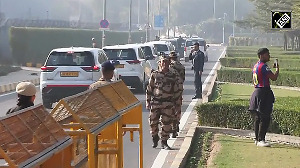Kerry told a press conference in New Delhi that the deal, with "enormous benefits" bilaterally, cannot be seen only in the context of India-US relations but had implications at the global level.
Kerry, a member of the US Senate's Foreign Relations Committee, said Prime Minister Manmohan Singh had told him during their meeting on Thursday that India would sign the Fissile Material Control Treaty.
"I will be disingenuous to suggest that if the agreement (on civilian nuclear cooperation) comes through, it will not grant nuclear power status to India. Obviously, it does," he said.
Noting that India had passed a law on prevention of non-proliferation, Kerry said the legislation should be a part of the India-US nuclear agreement, as it will act as an assurance with regard to guarantees under the International Atomic Energy Agency and Non-Proliferation Protocol.
"There are still a number of different avenues open to be explored and it is worthwhile to explore. There is a future ahead," the American senator said at the media interaction organised by non-governmental strategic policy think-tank Observers Research Foundation.
On the upcoming talks between Foreign Secretary Shyam Saran and US Under Secretary of State Nicholas Burns on the nuclear issue, he said the American side would talk about the "full definition" of separation of civilian and military nuclear facilities and what it entails.
With regard to how Congress will approach the nuclear deal, Kerry said it would depend on "the four corners of the agreement". He, however, added, "In principle, it would be better to have India as a participant in the IAEA procedures and standards than not to have it."
Refusing to talk about the history of India-US relations, which was a past, he said a "future history (in bilateral relations) is to be written. There is tremendous opportunity for us, if we take advantage of it and do what is needed."
He said it is "important, compelling and appropriate" that the full potential of the relations is realised by the two countries.





